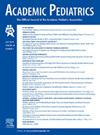Who Interviews Residency Applicants? A National Study of Pediatric Programs’ Practices
IF 2.8
3区 医学
Q1 PEDIATRICS
引用次数: 0
Abstract
Objective
Interviews play a critical role in assessing applicants for residency. Historically, these interviews have been conducted primarily by faculty; however, in recent years, more programs have begun using nonfaculty interviewers. We aimed to characterize the identity, prevalence, motivations behind, and perceived benefits and challenges of utilizing nonfaculty interviewers during pediatric residency recruitment.
Methods
We developed and distributed a survey to program leaders of all US categorical pediatric residencies from September to December 2022 to inquire about their interview methods. We analyzed the data using descriptive statistics and inductive content analysis for free-text responses.
Results
The response rate was 65% (125/193 programs). Overall, 71% of programs used nonfaculty interviewers, with the most common groups being chief residents (if not considered clinical faculty) (58%), residents (31%), and fellows (14%). Perceived benefits of nonfaculty interviewers included providing diverse perspectives in evaluating applicants and increasing the number of interviewers. Noted challenges were scheduling difficulties, assuring adequate training and preparation, and the uncertainty of applicant perceptions of interviewing with nonfaculty members. Many programs felt that each nonfaculty interviewer group positively or very positively impacted residency interviews (71%, 87/123).
Conclusions
Many programs utilize nonfaculty interviewers during pediatric residency recruitment. Respondents described several perceived benefits and challenges related to these interviewers and overall felt their inclusion positively impacted recruitment. These study findings can serve as a resource for program leaders seeking to evaluate and evolve their current interview practices.
谁来面试住院医师申请人?国家儿科项目实践研究。
目的:面试在评估住院医师申请人中起着至关重要的作用。从历史上看,这些访谈主要是由教师进行的;然而,近年来,越来越多的项目开始使用非教员面试官。我们的目的是描述在儿科住院医师招聘过程中使用非教师面试官的身份、流行程度、背后的动机以及感知到的好处和挑战。方法:我们在2022年9月至12月期间对美国所有儿科住院医师的项目负责人进行了调查,以了解他们的访谈方法。我们使用描述性统计和自由文本响应的归纳内容分析来分析数据。结果:有效率为65%(125/193例)。总体而言,71%的项目使用非教员面试官,最常见的群体是总住院医师(如果不考虑临床教员)(58%)、住院医师(31%)和研究员(14%)。非学院面试官的好处包括在评估申请者时提供不同的视角,增加面试官的数量。值得注意的挑战是安排困难,确保充分的培训和准备,以及申请人对非教职员工面试的不确定看法。许多项目认为每个非学院面试官组对住院医师面试有积极或非常积极的影响(71%,87/123)。结论:许多项目在儿科住院医师招聘过程中使用非教师面试官。受访者描述了与这些面试官相关的几个好处和挑战,总体上认为他们的加入对招聘产生了积极的影响。这些研究结果可以作为项目负责人寻求评估和改进其当前面试实践的资源。
本文章由计算机程序翻译,如有差异,请以英文原文为准。
求助全文
约1分钟内获得全文
求助全文
来源期刊

Academic Pediatrics
PEDIATRICS-
CiteScore
4.60
自引率
12.90%
发文量
300
审稿时长
60 days
期刊介绍:
Academic Pediatrics, the official journal of the Academic Pediatric Association, is a peer-reviewed publication whose purpose is to strengthen the research and educational base of academic general pediatrics. The journal provides leadership in pediatric education, research, patient care and advocacy. Content areas include pediatric education, emergency medicine, injury, abuse, behavioral pediatrics, holistic medicine, child health services and health policy,and the environment. The journal provides an active forum for the presentation of pediatric educational research in diverse settings, involving medical students, residents, fellows, and practicing professionals. The journal also emphasizes important research relating to the quality of child health care, health care policy, and the organization of child health services. It also includes systematic reviews of primary care interventions and important methodologic papers to aid research in child health and education.
 求助内容:
求助内容: 应助结果提醒方式:
应助结果提醒方式:


